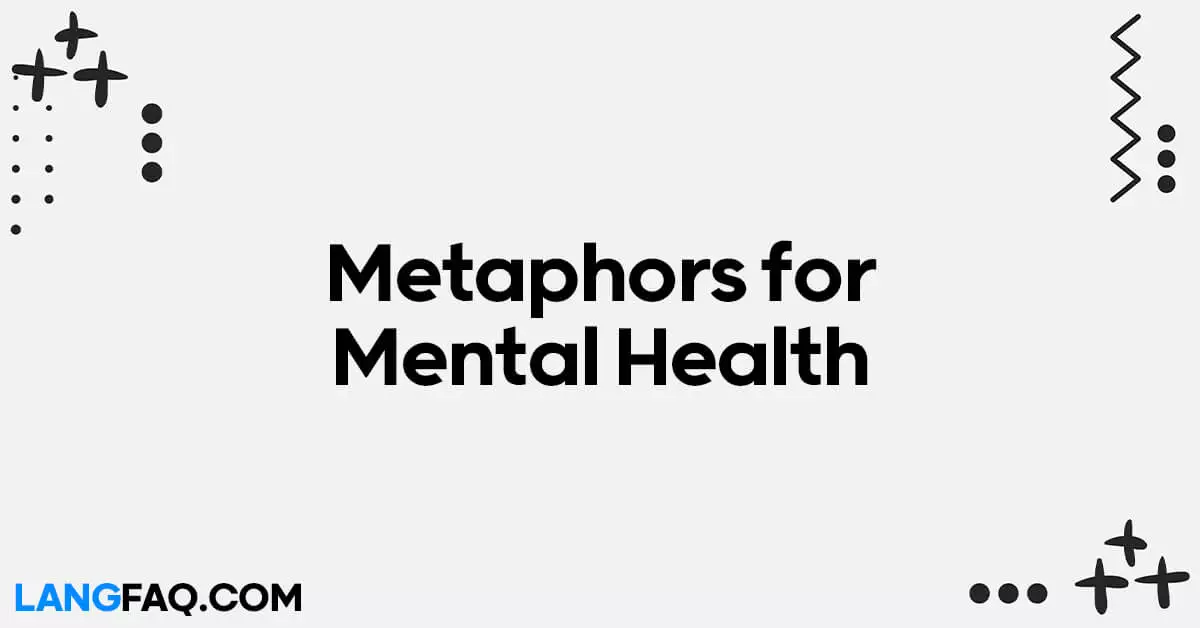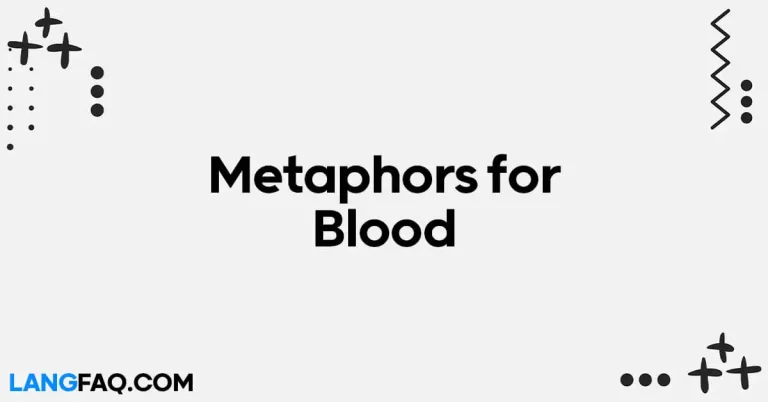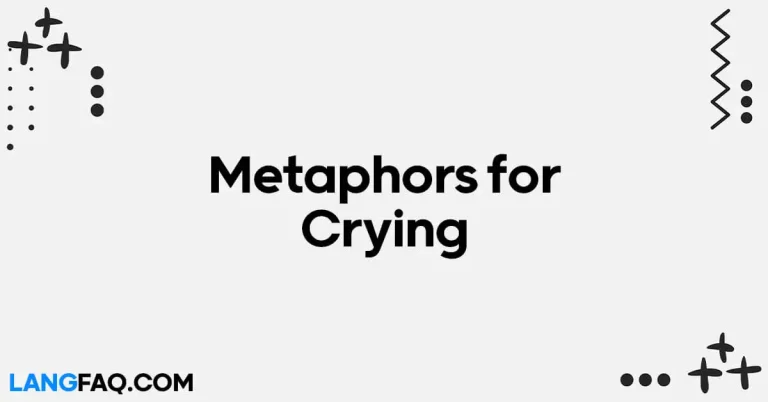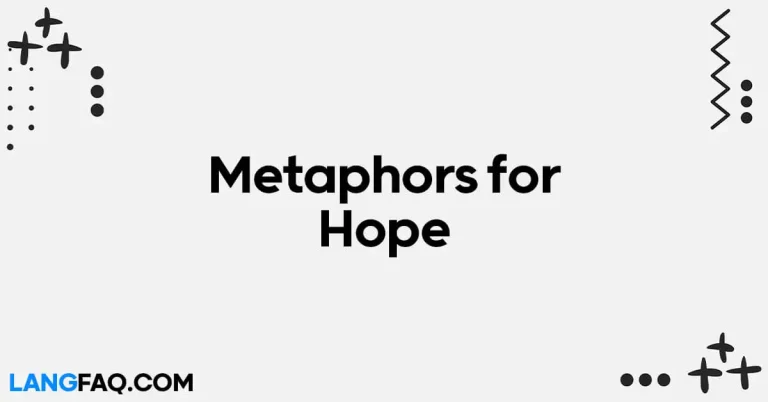Mental health, a topic often laden with complexity, finds a unique ally in metaphors. These linguistic devices go beyond the ordinary, offering a nuanced lens through which we can understand and discuss mental well-being. In this article, we delve into the world of “26 Metaphors for Mental Health,” exploring their significance, types, and practical applications.
26 Metaphors for Mental Health
- The Inner Garden: Nurturing positive thoughts and weeding out negativity creates a flourishing mental landscape.
- Stormy Seas: Navigating mental health challenges can feel like sailing through stormy seas. Understanding that storms pass and calm waters return fosters resilience.
- Puzzle Pieces: Our mental well-being is like a complex puzzle. Each piece represents a facet of our life, and finding the right fit contributes to a harmonious picture.
- Symphony of Emotions: Emotions orchestrate our mental landscape like a symphony. Recognizing and embracing each note, be it joy or sadness, creates a balanced emotional composition.
- Sunrise after the Night: In the darkest moments, mental health can be likened to a sunrise after a long night. The promise of a new day brings hope and renewal.
- Seasons of the Mind: Just as seasons change, our mental states shift. Acknowledging the ebb and flow helps us navigate the various seasons of the mind with grace.
- Butterfly Metamorphosis: Mental health growth mirrors a butterfly’s metamorphosis. Emerging from struggles, we can transform into stronger, resilient versions of ourselves.
- Starry Night Sky: Our thoughts, like stars in the night sky, illuminate our mental space. Focusing on positive constellations fosters a brighter mental outlook.
- Balancing Act: Maintaining mental health is a delicate balance, akin to walking on a tightrope. Mindfulness and self-care contribute to a stable and resilient equilibrium.
- Gardening the Mind: Tending to our mental well-being is a continuous process, akin to gardening. Regular care and attention ensure a thriving and resilient mental landscape.
- Mosaic of Experiences: Life’s experiences shape our mental mosaic. Each fragment contributes to a unique and intricate pattern, emphasizing the richness of our journey.
- Tree of Resilience: Resilience, a cornerstone of mental health, can be compared to a sturdy tree. Deep roots anchor us during storms, enabling growth and strength.
- Dance of Thoughts: Thoughts dance through our minds like graceful performers. Acknowledging their presence without judgment fosters a healthier mental rhythm.
- Fountain of Positivity: Cultivating mental health involves tapping into a fountain of positivity. Regularly replenishing this source contributes to sustained well-being.
- Bridge of Connection: Connecting with others creates a bridge to better mental health. Building supportive relationships fosters a sense of belonging and shared understanding.
- Echoes in the Canyon: Mental health echoes through the canyons of our minds. Recognizing and addressing these echoes allows for a more resonant and harmonious inner landscape.
- Blank Canvas: Every day presents a blank canvas for our mental well-being. Choosing the colors and brushstrokes consciously contributes to a vibrant and intentional masterpiece.
- Sunrise Yoga: Engaging in mental well-being practices, such as sunrise yoga, aligns the mind and body. The gentle start to the day sets a positive tone for overall mental health.
- Compass Guiding Emotions: A mental health compass helps navigate the vast sea of emotions. Understanding and trusting this internal guide contributes to emotional balance.
- Lighthouse in the Fog: In moments of uncertainty, mental health can be likened to a lighthouse cutting through the fog. Clarity emerges, guiding us through challenging times.
- Rain and Growth: Just as rain nourishes the soil, challenges contribute to mental health growth. Embracing difficulties fosters resilience and personal development.
- Library of Self-Reflection: Our minds house a library of self-reflection. Regularly exploring this library enhances self-awareness and contributes to ongoing mental well-being.
- Compassionate Gardener: Being a compassionate gardener of our thoughts involves nurturing positivity and weeding out negativity. This mindful cultivation contributes to a thriving mental garden.
- Tapestry of Connection: Interconnectedness with others weaves a tapestry of mental well-being. Recognizing our threads in this intricate design fosters a sense of unity and support.
- Solar System of Goals: Setting and pursuing goals creates a mental solar system. Each goal, like a planet, contributes to the overall harmony and purpose of our mental landscape.
- Sailing into Serenity: Navigating the waters of mental health can be a serene sail. Equipping ourselves with coping mechanisms is akin to ensuring a smooth and peaceful journey.
| Metaphor | Meaning | Examples |
|---|---|---|
| The Inner Garden | Nurturing positive thoughts for a flourishing mind. | Planting seeds of gratitude and weeding out negative self-talk. |
| Stormy Seas | Navigating challenges in mental health. | Facing stress and uncertainty with resilience and determination. |
| Puzzle Pieces | Understanding mental well-being as a complex puzzle. | Each life aspect fitting together to create a harmonious picture. |
| Symphony of Emotions | Emotions orchestrating our mental landscape. | Acknowledging and embracing the various emotions we experience. |
| Sunrise after the Night | Finding hope and renewal in dark moments. | Believing in a better tomorrow after overcoming difficulties. |
| Seasons of the Mind | Acknowledging the natural ebb and flow of mental states. | Understanding that moods and emotions change like seasons. |
| Butterfly Metamorphosis | Transforming through struggles into a resilient self. | Emerging stronger and wiser after overcoming personal challenges. |
| Starry Night Sky | Thoughts illuminating our mental space like stars. | Focusing on positive thoughts to create a brighter mental outlook. |
| Balancing Act | Maintaining a delicate balance for stable well-being. | Juggling responsibilities while prioritizing self-care. |
| Gardening the Mind | Continuously tending to mental well-being. | Nurturing positive thoughts and weeding out negativity. |
| Mosaic of Experiences | Life’s experiences shaping a unique mental mosaic. | Every experience contributing to the intricate pattern of our life. |
| Tree of Resilience | Resilience as a sturdy tree with deep roots. | Drawing strength from challenges, like a tree standing firm. |
| Dance of Thoughts | Thoughts moving through our minds like graceful dancers. | Observing thoughts without judgment, allowing a healthier rhythm. |
| Fountain of Positivity | Cultivating a source of positivity for sustained well-being. | Regularly replenishing positivity for a positive mental outlook. |
| Bridge of Connection | Building connections for better mental health. | Forming supportive relationships to foster understanding. |
| Echoes in the Canyon | Mental health resonating through the canyons of our minds. | Addressing and understanding the echoes of our thoughts and emotions. |
| Blank Canvas | Each day as a new opportunity for mental well-being. | Choosing thoughts and actions consciously for a positive impact. |
| Sunrise Yoga | Engaging in mental well-being practices for a positive start. | Starting the day with yoga to align the mind and body. |
| Compass Guiding Emotions | Using a mental health compass to navigate emotions. | Trusting internal guidance for emotional balance and well-being. |
| Lighthouse in the Fog | Mental clarity guiding through uncertain times. | Finding clarity and direction in moments of confusion or doubt. |
| Rain and Growth | Challenges contributing to mental health growth. | Embracing difficulties as opportunities for personal development. |
| Library of Self-Reflection | The mind as a repository for self-reflection and awareness. | Regularly exploring thoughts for enhanced self-awareness. |
| Compassionate Gardener | Nurturing positivity and weeding out negativity in thoughts. | Practicing self-compassion and mindful cultivation of thoughts. |
| Tapestry of Connection | Interconnectedness with others contributing to mental well-being. | Recognizing the importance of social connections for support. |
| Solar System of Goals | Setting and pursuing goals as a mental solar system. | Each goal contributing to the overall harmony and purpose of life. |
| Sailing into Serenity | Navigating mental health challenges for a serene journey. | Equipping oneself with coping mechanisms for a peaceful existence. |
These metaphors provide vivid imagery to help convey the complex and nuanced aspects of mental health.
1. The Inner Garden: Cultivating Positivity in Your Mind
Mental well-being, often compared to an inner garden, emphasizes the importance of nurturing positive thoughts and weeding out negativity. This metaphor offers a powerful image of our minds as fertile grounds that require constant care and attention.
Explanation:
Just as a gardener tends to their plants, we need to tend to our thoughts, fostering positivity and removing detrimental influences.
Scenario:
Professional Context:
In a workplace setting, encouraging a positive mindset can improve team dynamics and productivity. For instance, during a team meeting, a manager might say, “Let’s cultivate an inner garden of collaboration and support to achieve our project goals.”
Personal Context:
In a personal context, advising a friend going through a tough time could involve saying, “Consider your mind as an inner garden. Focus on planting positive thoughts, and soon you’ll see the flowers of optimism bloom.”
Example Sentence:
“Embrace the role of a mindful gardener, planting seeds of gratitude and uprooting the weeds of self-doubt.”
Tips:
Regular mindfulness practices, such as meditation or journaling, can act as essential tools for maintaining a flourishing inner garden.
2. Stormy Seas: Navigating Mental Health Challenges with Resilience
Depicting mental health challenges as stormy seas emphasizes the importance of resilience in navigating difficulties. This metaphor encourages individuals to understand that storms pass, and calm waters will return.
Explanation:
Stormy seas symbolize the turbulent times in life, reminding us that resilience is the key to weathering these challenges and emerging stronger.
Scenario:
Professional Context:
During a challenging project at work, a team leader might say, “Just as ships navigate stormy seas, our team will navigate challenges with resilience and determination.”
Personal Context:
Supporting a friend through a tough situation could involve saying, “Think of this as a stormy sea; it may be rough now, but your resilience will guide you to calmer waters.”
Example Sentence:
“Embrace the storms, for they shall pass, leaving you with the strength of a seasoned sailor.”
Tips:
Building resilience involves recognizing and adapting to challenges rather than succumbing to them. Seeking support from friends, family, or professionals is also crucial.
3. Puzzle Pieces: Understanding the Complexity of Mental Well-being
Viewing mental well-being as a puzzle underscores its intricate nature, with each piece representing a facet of our lives. This metaphor encourages a holistic approach to understanding and improving mental health.
Explanation:
Every aspect of our lives contributes to the complex puzzle of mental well-being, and finding the right fit for each piece is essential for a harmonious picture.
Scenario:
Professional Context:
In a coaching session, a mentor might say, “Consider your career, relationships, and personal growth as puzzle pieces. Aligning them will create a complete and fulfilling picture.”
Personal Context:
Advising a family member on overall well-being could involve saying, “Life is like a puzzle; pay attention to each piece, from work to relationships, to create a balanced and fulfilling picture.”
Example Sentence:
“Approach your life as a puzzle, where each decision and experience fits into the grand mosaic of your well-being.”
Tips:
Regular self-reflection can help identify which “puzzle pieces” may need adjustment for a more harmonious mental picture.
4. Symphony of Emotions: Embracing the Harmony Within
The metaphor of a symphony of emotions illustrates how our emotions orchestrate our mental landscape, creating a unique and balanced composition.
Explanation:
Just as a symphony consists of various instruments playing in harmony, embracing and acknowledging our emotions contributes to a balanced mental state.
Scenario:
Professional Context:
In a team-building workshop, a facilitator might say, “Think of our emotions as instruments in a symphony. Each team member contributes to the harmonious success of the project.”
Personal Context:
Discussing emotional well-being with a friend could involve saying, “Life is a symphony of emotions; each feeling contributes to the beautiful composition of your unique journey.”
Example Sentence:
“Let your emotions play together in a symphony, creating a melodious harmony within.”
Tips:
Practice emotional intelligence by recognizing and understanding the nuances of each emotion, fostering a more harmonious mental state.
5. Sunrise after the Night: Finding Hope in Dark Moments
Comparing mental health to a sunrise after a dark night emphasizes the cyclical nature of challenges and the hope that comes with new beginnings.
Explanation:
Just as the darkest hours precede dawn, difficult moments can lead to a brighter, more hopeful future.
Scenario:
Professional Context:
During a team meeting after a setback, a leader might say, “Remember, every challenge is a step closer to success. Our sunrise after this night will be even more glorious.”
Personal Context:
Supporting a friend through a tough time could involve saying, “Think of this period as a dark night; a new day with renewed hope is on the horizon.”
Example Sentence:
“In your journey, anticipate the sunrise after the night, bringing hope and a fresh start.”
Tips:
Maintain a positive outlook during challenging times, recognizing that difficulties are often followed by opportunities for growth and renewal.
6. Seasons of the Mind: Embracing Change and Growth
Understanding mental states as changing seasons encourages acknowledging the natural ebb and flow of emotions and experiences.
Explanation:
Just as seasons transition, our mental states evolve, and recognizing this helps us navigate life’s different phases.
Scenario:
Professional Context:
In a career development workshop, a mentor might say, “Consider your career journey as experiencing different seasons. Each phase contributes to your overall growth.”
Personal Context:
Advising a family member through a life transition could involve saying, “Life has its seasons; embrace change, for growth often comes with the shifting winds.”
Example Sentence:
“Your mental well-being experiences various seasons; each one contributes to the richness of your overall journey.”
Tips:
Practice adaptability and resilience, understanding that different mental states contribute to personal development.
7. Butterfly Metamorphosis: Emerging Stronger from Struggles
The metaphor of a butterfly metamorphosis highlights the transformative power of overcoming challenges and emerging as a stronger, resilient individual.
Explanation:
Just as a caterpillar undergoes metamorphosis to become a butterfly, facing and overcoming challenges can lead to personal growth.
Scenario:
Professional Context:
During a team-building seminar, a speaker might say, “Think of our setbacks as a cocoon. Through teamwork, we can emerge stronger, just like a butterfly after metamorphosis.”
Personal Context:
Supporting a friend through difficulties could involve saying, “You’re undergoing a metamorphosis; embrace the changes, and you’ll emerge stronger, just like a butterfly.”
Example Sentence:
“Your journey mirrors the butterfly’s metamorphosis, transforming challenges into strength and resilience.”
Tips:
Acknowledge and learn from challenges, recognizing that each difficulty contributes to personal growth and strength.
8. Starry Night Sky: Illuminating Your Mental Space
The metaphor of thoughts as stars in a night sky emphasizes the importance of focusing on positive thoughts to create a brighter mental outlook.
Explanation:
Just as stars illuminate the night sky, positive thoughts can brighten our mental space.
Scenario:
Professional Context:
During a team motivation session, a leader might say, “Let positivity be our guiding star, illuminating our path to success in the professional night sky.”
Personal Context:
Encouraging a friend during tough times could involve saying, “Your thoughts are like stars; focus on the positive ones, and they’ll brighten your mental night sky.”
Example Sentence:
“Imagine your thoughts as stars in the night sky, guiding you towards a brighter mental perspective.”
Tips:
Cultivate a habit of positive thinking, focusing on uplifting thoughts to create a more optimistic mental environment.
9. Balancing Act: Maintaining Stability in Mental Well-being
Depicting mental health as a delicate balancing act highlights the importance of mindfulness and self-care for a stable and resilient equilibrium.
Explanation:
Just as a tightrope walker maintains balance, practicing mindfulness helps achieve stability in mental well-being.
Scenario:
Professional Context:
In a stress management seminar, a speaker might say, “Consider your work-life balance as a delicate tightrope walk. Mindfulness is the key to maintaining stability.”
Personal Context:
Advising a friend on self-care could involve saying, “Life is a balancing act. Prioritize self-care to ensure a stable and resilient mental equilibrium.”
Example Sentence:
“Navigating mental well-being is akin to a delicate balancing act; prioritize mindfulness to maintain stability.”
Tips:
Incorporate mindfulness practices into daily routines, recognizing the importance of maintaining a stable mental balance.
10. Gardening the Mind: Continuous Care for Mental Well-being
Viewing mental well-being as a continuous process of gardening emphasizes the importance of regular care and attention to ensure a thriving and resilient mental landscape.
Explanation:
Similar to tending a garden, regular care of thoughts contributes to a flourishing mental state.
Scenario:
Professional Context:
In a workplace wellness program, a facilitator might say, “Think of your mind as a garden. Regular care and positive thoughts contribute to a thriving mental landscape.”
Personal Context:
Encouraging a family member during challenging times could involve saying, “Nurture your mind like a garden. Regular care ensures a flourishing mental state.”
Example Sentence:
“Embrace the role of a mindful gardener, regularly tending to your thoughts for a thriving mental garden.”
Tips:
Practice regular self-reflection and engage in activities that promote positive mental well-being.
11. Mosaic of Experiences: Shaping a Unique Mental Landscape
The metaphor of life’s experiences forming a mosaic underscores the idea that every fragment contributes to the intricate pattern of our mental well-being. This encourages embracing the richness and diversity of our journey.
Explanation:
Each experience, positive or challenging, contributes to the overall tapestry of our mental landscape, creating a unique mosaic.
Scenario:
Professional Context:
In a career development workshop, a mentor might say, “Your career is a mosaic of experiences. Embrace the diversity; it shapes your unique professional tapestry.”
Personal Context:
Discussing life with a friend could involve saying, “Our lives are mosaics; every experience, every choice, contributes to the beautiful and unique pattern of who we are.”
Example Sentence:
“Consider your life as a mosaic, each experience contributing to the intricate pattern of your mental well-being.”
Tips:
Acknowledge and appreciate the diverse experiences life offers, recognizing their collective impact on your mental landscape.
12. Tree of Resilience: Rooted Strength During Life’s Storms
Depicting resilience as a sturdy tree with deep roots emphasizes the role of strength and stability during life’s storms. This metaphor encourages drawing on internal resources for support.
Explanation:
Just as a tree withstands storms with its deep roots, resilience provides internal strength during challenging times.
Scenario:
Professional Context:
In a leadership seminar, a speaker might say, “Leadership is like a resilient tree. Deep roots of resilience provide stability during organizational storms.”
Personal Context:
Supporting a friend through difficulties could involve saying, “Picture yourself as a resilient tree. Your deep roots of resilience will help weather any storm.”
Example Sentence:
“Like a tree standing firm in a storm, resilience provides the internal strength to navigate life’s challenges.”
Tips:
Cultivate resilience through self-reflection and coping strategies, ensuring internal strength during life’s inevitable storms.
13. Dance of Thoughts: Observing the Rhythm of Your Mind
The metaphor of thoughts dancing through our minds emphasizes the importance of acknowledging and observing these mental movements without judgment.
Explanation:
Our thoughts, like dancers, move gracefully through our minds, and observing them without judgment contributes to mental well-being.
Scenario:
Professional Context:
In a stress management workshop, a facilitator might say, “Picture your thoughts as dancers. Observe their movements without judgment to maintain a balanced mental rhythm.”
Personal Context:
Encouraging a friend during a busy day could involve saying, “Let your thoughts dance gracefully. Observing them without judgment can bring a sense of mental balance.”
Example Sentence:
“Engage in the dance of thoughts, observing their movements without judgment for a more balanced mental rhythm.”
Tips:
Practice mindfulness to observe thoughts without attaching judgment, fostering a healthier mental state.
14. Fountain of Positivity: Replenishing Your Mental Well-being
The metaphor of cultivating a fountain of positivity highlights the importance of regularly replenishing positive thoughts for sustained mental well-being.
Explanation:
Similar to a fountain that continuously replenishes water, cultivating positive thoughts contributes to a sustained positive mental outlook.
Scenario:
Professional Context:
In a team-building session, a facilitator might say, “Let’s create a fountain of positivity within our team. Regular replenishment will lead to sustained well-being.”
Personal Context:
Encouraging a family member could involve saying, “Imagine your mind as a fountain of positivity. Regularly replenish it for a sustained, positive mental outlook.”
Example Sentence:
“Regularly replenish your fountain of positivity, ensuring a continuous flow of optimism in your mental landscape.”
Tips:
Practice gratitude and engage in activities that bring joy to replenish the fountain of positivity regularly.
15. Bridge of Connection: Building Supportive Relationships
Depicting mental health as a bridge of connection emphasizes the importance of building and maintaining supportive relationships for overall well-being.
Explanation:
Just as a bridge connects two points, relationships connect individuals, providing support and understanding.
Scenario:
Professional Context:
In a team-building workshop, a leader might say, “Our team is like a bridge of connection. Building strong relationships ensures a supportive and collaborative work environment.”
Personal Context:
Advising a friend on the importance of relationships could involve saying, “Picture your life as a bridge of connection. Strong relationships provide support during challenging times.”
Example Sentence:
“Building and maintaining strong connections forms a bridge of support, contributing to robust mental health.”
Tips:
Invest time in cultivating and nurturing relationships to ensure a strong and supportive bridge of connection.
16. Echoes in the Canyon: Recognizing and Addressing Mental Echoes
The metaphor of mental health echoes in the canyon emphasizes the significance of recognizing and addressing lingering thoughts and emotions for a more resonant and harmonious inner landscape.
Explanation:
Mental echoes symbolize recurring thoughts and emotions that, when acknowledged and addressed, contribute to a more harmonious mental state.
Scenario:
Professional Context:
In a team reflection session, a facilitator might say, “Consider our team dynamics as echoes in the canyon. Addressing lingering issues will contribute to a more harmonious work environment.”
Personal Context:
Discussing emotional well-being with a friend could involve saying, “Imagine your mind as a canyon. Addressing mental echoes ensures a more resonant and harmonious inner landscape.”
Example Sentence:
“Recognize and address the echoes in your mental canyon for a more resonant and harmonious inner landscape.”
Tips:
Practice self-reflection and address recurring thoughts and emotions to foster a more harmonious mental state.
17. Blank Canvas: Daily Opportunities for Mental Well-being
The metaphor of each day as a blank canvas emphasizes the idea that daily life presents opportunities for intentional choices that impact mental well-being.
Explanation:
Just as an artist starts with a blank canvas, each day offers a fresh start to paint positive thoughts and actions for a more intentional mental outlook.
Scenario:
Professional Context:
In a team motivation session, a leader might say, “Think of each workday as a blank canvas. Your actions and decisions will shape the masterpiece of our collective success.”
Personal Context:
Advising a friend on daily positivity could involve saying, “Consider every morning as a blank canvas. Paint it with intentional choices for a brighter mental outlook.”
Example Sentence:
“Approach each day as a blank canvas, choosing the colors of positivity and purpose for a vibrant mental masterpiece.”
Tips:
Start each day with a positive intention, recognizing the daily opportunities for shaping a more intentional mental state.
18. Sunrise Yoga: Aligning Mind and Body for Positive Starts
Engaging in sunrise yoga as a metaphor for mental well-being encourages the alignment of mind and body, setting a positive tone for the day.
Explanation:
Similar to sunrise yoga aligning the body, fostering a connection between mind and body promotes a positive mental outlook.
Scenario:
Professional Context:
In a workplace wellness program, a coach might say, “Consider morning yoga as a mental reset. Aligning mind and body sets a positive tone for the workday.”
Personal Context:
Encouraging a family member to try morning yoga could involve saying, “Embrace sunrise yoga for a holistic start. Aligning mind and body promotes a positive mental state.”
Example Sentence:
“Embark on the journey of sunrise yoga, aligning your mind and body for a positive and energized start to the day.”
Tips:
Incorporate mindfulness practices, such as yoga, into your morning routine for a holistic approach to mental well-being.
19. Compass Guiding Emotions: Navigating with Emotional Intelligence
The metaphor of a mental health compass highlights the importance of emotional intelligence in navigating the vast sea of emotions.
Explanation:
Similar to a compass guiding direction, emotional intelligence acts as a tool for navigating and understanding various emotions.
Scenario:
Professional Context:
In a leadership seminar, a speaker might say, “Leadership requires a compass of emotional intelligence. Navigating emotions ensures a balanced and empathetic work environment.”
Personal Context:
Advising a friend through challenging times could involve saying, “Consider emotional intelligence as your compass. Navigating emotions with understanding leads to personal growth.”
Example Sentence:
“Trust your mental health compass, guiding you through the vast sea of emotions with empathy and understanding.”
Tips:
Develop emotional intelligence by recognizing and understanding emotions, fostering a more balanced and empathetic mental state.
20. Lighthouse in the Fog: Clarity in Uncertain Moments
The metaphor of a lighthouse cutting through the fog emphasizes the role of mental clarity in navigating uncertainty.
Explanation:
Just as a lighthouse provides clarity in foggy conditions, mental clarity guides individuals through moments of confusion or doubt.
Scenario:
Professional Context:
In a strategic planning meeting, a manager might say, “Our goals are the lighthouse in the fog. Clarity will guide us through uncertainty towards success.”
Personal Context:
Supporting a friend facing uncertainties could involve saying, “Think of your goals as a lighthouse. Clarity will cut through the fog of uncertainty, guiding you forward.”
Example Sentence:
“Maintain mental clarity as your guiding lighthouse, cutting through the fog of uncertainty towards a clearer path.”
Tips:
Prioritize self-reflection and goal-setting to enhance mental clarity during uncertain moments.
21. Rain and Growth: Embracing Challenges for Personal Development
The metaphor of rain nourishing the soil illustrates the idea that challenges contribute to mental health growth and personal development.
Explanation:
Similar to rain fostering growth, facing challenges provides opportunities for personal development and mental well-being.
Scenario:
Professional Context:
In a team-building workshop, a facilitator might say, “Challenges are like rain. Embrace them, for they nurture the soil of personal and professional growth.”
Personal Context:
Encouraging a family member during tough times could involve saying, “Picture challenges as rain. Embrace them, as they provide the nourishment for your personal growth.”
Example Sentence:
“Welcome challenges as the rain that nurtures personal growth, contributing to the flourishing landscape of your mental well-being.”
Tips:
Adopt a growth mindset, recognizing challenges as opportunities for learning and personal development.
22. Library of Self-Reflection: Exploring the Depths of Self-Awareness
The metaphor of the mind as a library emphasizes the importance of self-reflection in enhancing self-awareness.
Explanation:
Similar to a library holding vast knowledge, regularly exploring one’s thoughts contributes to a deeper understanding of oneself.
Scenario:
Professional Context:
In a leadership development seminar, a mentor might say, “Think of self-reflection as your leadership library. Exploring your thoughts enhances self-awareness and growth.”
Personal Context:
Advising a friend on personal development could involve saying, “Your mind is a library. Regular self-reflection allows you to explore the depths of self-awareness.”
Example Sentence:
“Embrace your mind as a library of self-reflection, where exploring your thoughts leads to profound self-awareness.”
Tips:
Engage in regular self-reflection practices, such as journaling or meditation, to enhance self-awareness.
23. Compassionate Gardener: Nurturing Positivity in Thought Gardens
The metaphor of being a compassionate gardener emphasizes the practice of nurturing positivity and weeding out negativity in our thought gardens.
Explanation:
Similar to a gardener tending to plants, practicing self-compassion involves nurturing positive thoughts and removing detrimental influences.
Scenario:
Professional Context:
In a team-building workshop, a facilitator might say, “Be a compassionate gardener of your thoughts. Nurturing positivity within the team fosters a positive work environment.”
Personal Context:
Encouraging a friend during challenging times could involve saying, “Imagine yourself as a compassionate gardener. Cultivate positivity, and your thought garden will flourish.”
Example Sentence:
“As a compassionate gardener, tend to your thought garden, nurturing positivity and weeding out negativity for a thriving mental landscape.”
Tips:
Practice self-compassion and mindfulness to actively tend to your thought garden for a positive mental outlook.
24. Tapestry of Connection: Interconnectedness for Mental Well-being
The metaphor of a tapestry of connection emphasizes the importance of interconnectedness with others for overall mental well-being.
Explanation:
Similar to a tapestry weaving various threads together, recognizing and fostering connections contributes to robust mental health.
Scenario:
Professional Context:
In a team-building seminar, a speaker might say, “Our team is a tapestry of connection. Building and strengthening connections fosters a supportive work environment.”
Personal Context:
Advising a friend on the value of relationships could involve saying, “Picture your life as a tapestry of connection. Strong relationships weave together for overall well-being.”
Example Sentence:
“Foster connections as threads in the tapestry of your life, contributing to a strong and supportive mental landscape.”
Tips:
Actively build and nurture connections, recognizing the positive impact they have on mental well-being.
25. Solar System of Goals: Pursuing a Harmonious Life Purpose
The metaphor of setting and pursuing goals as a solar system emphasizes the idea that each goal contributes to the overall harmony and purpose of life.
Explanation:
Similar to celestial bodies in a solar system, each goal plays a vital role in creating a harmonious and purposeful life.
Scenario:
Professional Context:
In a goal-setting workshop, a facilitator might say, “Think of your career goals as celestial bodies. Each contributes to the overall harmony and success of your professional solar system.”
Personal Context:
Encouraging a family member in goal-setting could involve saying, “Your life goals are like a solar system. Each goal adds purpose, creating a harmonious and fulfilling journey.”
Example Sentence:
“Pursue your goals as celestial bodies in your solar system, contributing to the overall harmony and purpose of your life.”
Tips:
Set clear goals aligned with your values, recognizing their collective contribution to a fulfilling life purpose.
26. Sailing into Serenity: Equipping for a Peaceful Existence
The metaphor of sailing into serenity emphasizes the idea of equipping oneself with coping mechanisms to navigate mental health challenges for a peaceful existence.
Explanation:
Similar to sailing with the right equipment, having coping mechanisms ensures a more serene journey through mental health challenges.
Scenario:
Professional Context:
In a stress management seminar, a coach might say, “Equip yourself with coping strategies. Sailing into serenity ensures a peaceful and focused professional journey.”
Personal Context:
Supporting a friend through challenges could involve saying, “Think of coping mechanisms as your sailing equipment. They will guide you into the serenity of a peaceful existence.”
Example Sentence:
“Equip yourself with coping mechanisms, sailing into the serenity of a peaceful existence amidst life’s challenges.”
Tips:
Identify and practice coping strategies that resonate with you, promoting a more serene and peaceful mental state.
FAQs
How do metaphors enhance our understanding of mental health?
Metaphors provide a unique lens through which we can contemplate and understand complex concepts. They offer vivid imagery that resonates with our experiences, making it easier to grasp nuanced aspects of mental health.
Can metaphors be used as therapeutic tools for mental health?
Yes, metaphors can be powerful therapeutic tools. They help individuals express and explore their emotions, making the therapeutic process more accessible and relatable.
Are there cultural differences in interpreting mental health metaphors?
Certainly, cultural backgrounds can influence how individuals interpret metaphors. It’s essential to consider cultural nuances when using metaphors in mental health discussions to ensure effective communication.
How can one incorporate these metaphors into daily mental health practices?
Integrating these metaphors into daily life involves mindful reflection. Take a moment to relate personal experiences to the metaphors, fostering a deeper understanding of mental well-being.
Are there metaphors specifically helpful for children’s mental health discussions?
Yes, metaphors can be adapted for different age groups. Simple and relatable metaphors can aid in conveying complex mental health concepts to children in an age-appropriate manner.
Can metaphors evolve over time in their meaning for an individual?
Absolutely, the meaning of metaphors can evolve based on personal experiences and growth. What resonates as a powerful metaphor at one point may take on new significance as individuals navigate their mental health journey.
Conclusion
Exploring the diverse metaphors for mental health offers a rich tapestry of insights. Each metaphor invites reflection and contemplation, providing valuable perspectives on the intricate landscape of well-being. As we embrace these metaphors, may they serve as guiding lights on our collective journey toward enhanced mental health.







